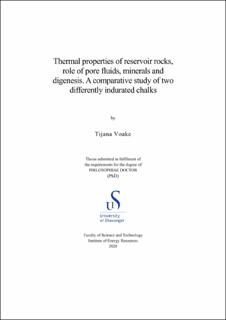Thermal properties of reservoir rocks, role of pore fluids, minerals and digenesis. A comparative study of two differently indurated chalks
Doctoral thesis

Åpne
Permanent lenke
https://hdl.handle.net/11250/2652761Utgivelsesdato
2020-01Metadata
Vis full innførselSamlinger
- PhD theses (TN-IER) [15]
Originalversjon
Thermal properties of reservoir rocks, role of pore fluids, minerals and digenesis. A comparative study of two differently indurated chalks by Tijana Voake. Stavanger : University of Stavanger, 2020 (PhD thesis UiS, no. 494)Sammendrag
Carbonate rocks are distressed by temperature fluctuations, most commonly observed in marble monuments and cladding exposed to varying outdoor temperatures. Similarly, reservoir rocks are cooled on periodic basises during oil production by injecting cold fluid, locally cooling the surrounding reservoir rock. The rock will then reheat to its original temperature when the injection stops. These temperature fluctuations can potentially cause deformation to the reservoir and change its mechanical properties, which must be taken into consideration during the recovery.
This body of work focuses on chalk reservoirs, where the proposed effect could be of importance because the main building agent of chalk is calcite, which has a highly anisotropic thermal expansion coefficient. Thus, temperature fluctuations could strain the grain contacts between neighbouring particles. To gain a better understanding of stress accumulation at the contact level, two chalks with differing degrees of contact cement are compared; higher indurated chalk from a quarry in Kansas (USA) and a low indurated chalk originating from Mons (Belgium). The interpretation of temperature dependence is based upon the analysis of three different series of experiments, each providing different mechanical parameter estimates relating to: tensile strength, elasto-plastic partitioning during hydrostatic stress cycles, and elastic moduli (Bulk modulus, Young’s modulus and shear modulus).
The influence of temperature cycling on tensile strength was tested using samples from the two chalk types in dry and water saturated states, and then exposed to 0, 15, and 30 temperature cycles. The dry samples were not influenced by temperature cycling for either of the chalk types. However, in the water saturated state, tensile strength is increasingly reduced with a progressive number of temperature cycles for both chalks.
The effect of temperature cycling was further examined by hydrostatic stress cycling in order to compare their mechanical responses. The two types of chalk were saturated by two different fluids to additionally determine the importance of water weakening. During a hydrostatic stress cycle, the total volumetric strain is partitioned into a reversible (elastic) and irreversible (plastic) component. Here, the fraction of irreversible strain during each stress cycle is reported and compared for the two chalks and two saturating fluids. All tests exposed to temperature cycling between each stress cycle accumulated more irreversible strain, the biggest difference was observed for the water saturated, highly indurated, Kansas chalk.
[...]
Består av
Paper 1: Voake, T., Nermoen, A., Ravnas, C., Korsnes, R.I., Fabricius, I.L. (2019). Influence of temperature cycling and pore fluid on tensile strength of chalk. Journal of Rock Mechanics and Geotechnical Engineering 11(2), pp. 277-288.Paper 2: Voake, T., Nermoen, A., Korsnes, R.I., Fabricius, I.L. (2019). Temperature cycling and its effect on mechanical behaviours of highporosity chalks. Journal of Rock Mechanics and Geotechnical Engineering 11(4), pp. 749-759.
Paper 3: Voake, T., Nermoen, A., Korsnes, R.I., Fabricius, I.L. (In review). Elastic moduli dependence on temperature cycling in high porosity chalks. Journal of Rock Mechanics and Geotechnical Engineering
Paper 4 (Not in Brage): Voake, T., Nermoen, A., Korsnes, R.I., Fabricius, I.L. (2017) Induced shear failure by temperature reduction at uni-axial strain conditions. EAGE - 19th European Symposium on Improved Oil Recovery/IOR Norway, Stavanger.
Paper 5: Voake, T., Nermoen, A., Korsnes, R.I., Fabricius, I.L. (2016). To what degree thermal cycles affect chalk strength. SCA annual symposium. Snowmass Colorado.